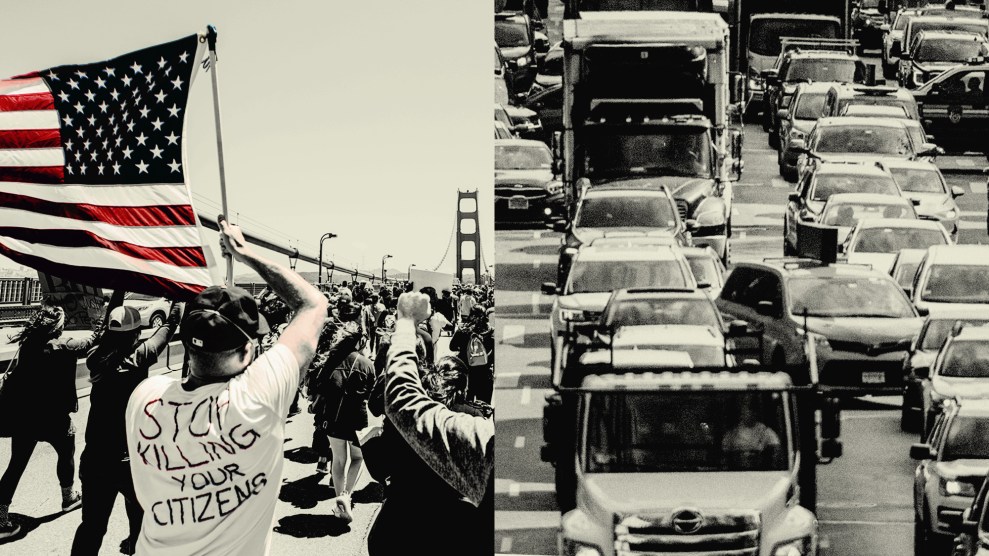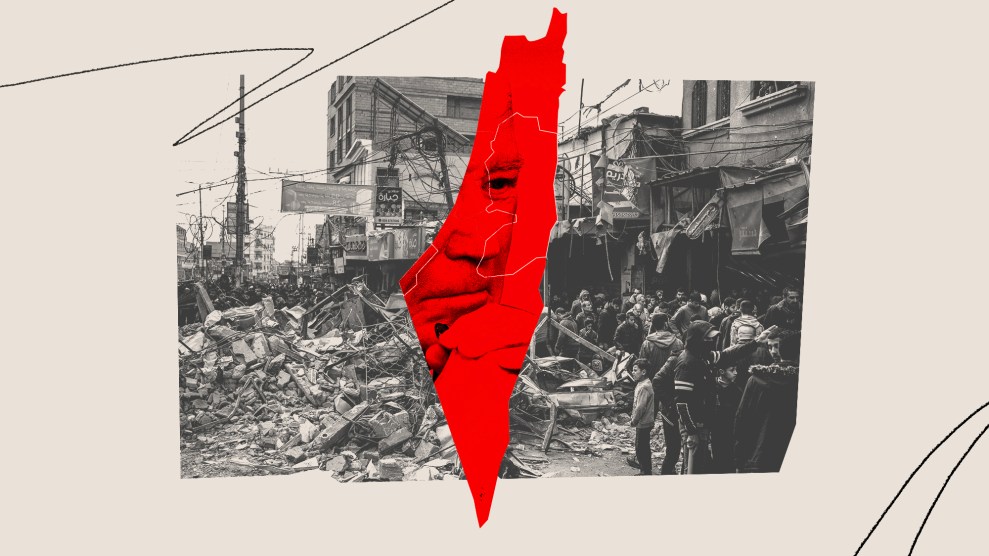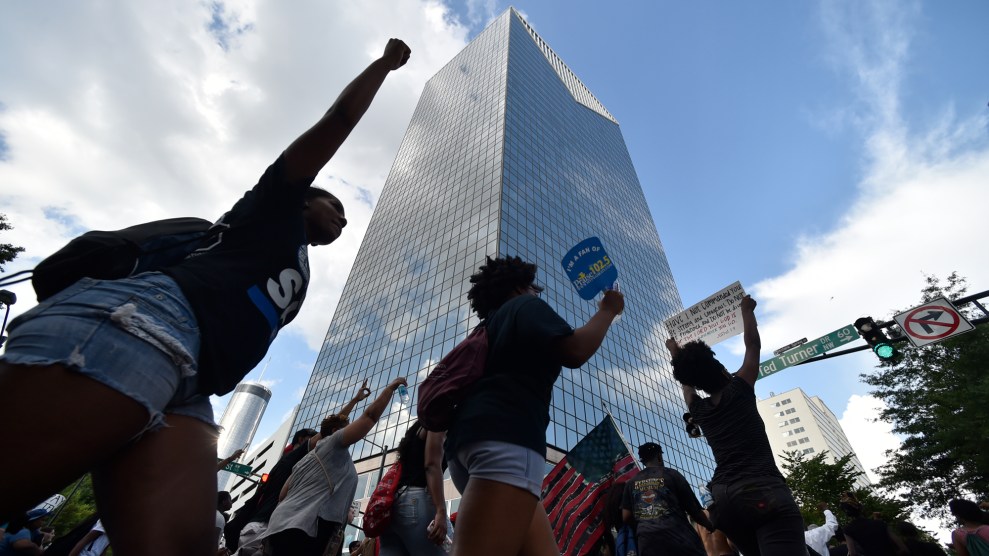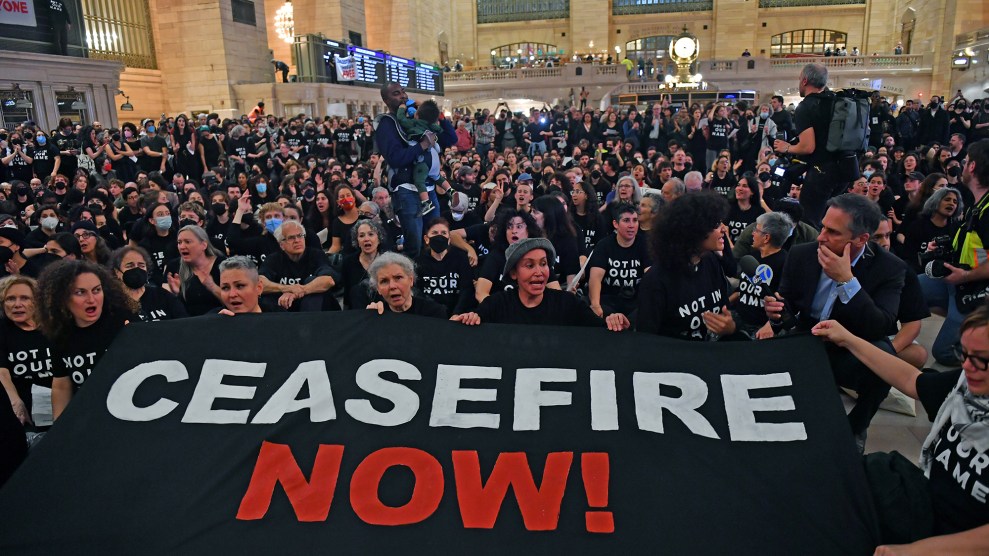
Mother Jones illustration; imageSPACE/ZUMA; Richard B. Levine/Levine Roberts/ZUMA
Last November, Arizona Republican State Senator John Kavanagh was fuming in front of a television. Hundreds of miles away, more than 70 people had stopped their cars on the Bay Bridge between San Francisco and Oakland. They turned off their engines, stepped out of their vehicles, and a few of them even purposefully threw their car keys into the water below. Then they linked arms and began to chant. Dozens of others created barriers around them and shouted too. President Joe Biden was in town for an international summit for world leaders, and the people on the bridge wanted him to call for a ceasefire in Israel’s war on Gaza. Five months later, the casualties are still mounting: More than 31,000 people have been killed and 70,000 wounded; Gaza is now home to the largest group of child amputees in history. Half of the population is near starvation.
On the bridge that day, police arrested 78 people and towed 29 cars. Still, Kavanagh stewed. Protesters had blocked off traffic in both directions of one of the country’s most important economic centers for four hours. For him, the day’s casualties were the ordinary people whose commutes had been disrupted.
“I thought it was outrageous what the protesters did,” he told me recently. “And that’s not based on their cause.”
So he did something. In December, he introduced a bill to Arizona’s state senate that would make purposefully blocking traffic a felony punishable by a year in prison.
“I don’t think anybody has the right to disrupt the lives of thousands of people,” Kavanagh said. For him, the crime wasn’t just about blocking traffic, but “steal[ing] hours of [people’s] lives away.”
Since last October, people have shut down countless public roads and bridges in an effort to secure an immediate ceasefire and end to US support for Israel’s war on Gaza. In January, thousands converged on Washington, DC for a permitted march that traveled through downtown DC and ended at the White House. But there have also been several unsanctioned traffic blockades, two of which, in Boston and DC, became a storyline on the day of Biden’s State of the Union address. Love them or hate them, these acts of civil disobedience appear to have been effective: Support for a ceasefire has grown exponentially. But some lawmakers are taking a different view. Since January, state and federal legislators have proposed a slate of bills that would make participating in an unsanctioned street protest a criminal or even terrorist act.
“It is unacceptable to block interstates, endanger the lives of Virginians and cause mayhem on our roads,” Virginia Gov. Glenn Youngkin wrote on Twitter two weeks ago after a pro-Palestine group staged a sit-in on I95, one of the busiest traffic corridors on the East Coast. Virginia State Police confirmed that ten people were arrested and charged with three misdemeanors—stopping the vehicle of another, obstructing free passage of others, and unlawful assembly—and one traffic violation.
Lawmakers in Alaska, Arizona, New Jersey, New York, Tennessee, Washington, and West Virginia have introduced new legislation designed to increase penalties for blocking traffic. The majority of the bills have been introduced by Republicans, except in New York, where a Democrat, Assemblywoman Stacey Pheffer Amato, is leading the charge.
If passed, these laws would take a variety of forms. In Arizona, blocking a highway or public road would become a felony, rather than a misdemeanor, punishable by up to more than 5 years in prison. In Massachusetts, it’s 10 years. New York officials want to expand their domestic terrorism law to include deliberately blocking public roads, bridges, or tunnels. West Virginia officials want to do the same, while carving out immunity for people who hit protesters with their cars.
For all of their distinctions, advocates say these bills have one important thing in common. “Most of the proposals are unnecessary,” says Vera Eidelman, staff attorney at the ACLU. Blocking traffic without a permit is already illegal in all 50 states and typically classified as a minor offense.
Lawmakers aren’t shy about using these bills to suppress dissent against Israel’s bombardment of Gaza. “We’re just done,” said Rep. Andrew Barkis (R-WA), the lead sponsor of a traffic obstruction bill, after pro-Palestinian protesters blocked a state interstate in January. Senators Thom Tillis (R-NC) and Marsha Blackburn (R-TN) were even more blunt, writing “[T]he Safe and Open Streets Act is in direct response to radical tactics of pro-Palestine protesters who have intentionally blocked roads and highways across the country.”
With or without a permit, shutting down traffic has always been an important tool for protesters. In the months leading up to the historic 1965 Voting Rights March from Selma to Montgomery, activists had to go to a federal court to secure a permit to legally assemble. Some local officials still declared their marches to be illegal. Judge Frank M. Johnson Jr., the district court judge who eventually issued the permit for the march that became known as “Bloody Sunday,” wrote in his decision that the court had a duty to draw a “constitutional boundary line” between the “competing interests of society” when protesters block highways and streets. That line should take into account “the enormity of the wrongs that are being protested and petitioned against.” In the case of voting rights, the judge wrote, “the wrongs are enormous. The extent of the right to demonstrate against these wrongs should be determined accordingly.”
And so it went. Six years later, anti-war activists without permits staged mass acts of civil disobedience to block traffic in Washington, DC, to call for an end to the Vietnam War. More recently, advocates for climate, immigrant justice, and racial justice movements have used similar forms of civil disobedience. Public reaction to them varies: Some commuters and pedestrians get angry, some ignore them, others applaud them.
This strategy has been utilized by protesters across the political spectrum. Anti-abortion activists have legally and illegally taken to the street to make their voices heard. Some have even blocked others’ freedom of movement and ability to access health care by obstructing access to abortion clinics. Trump supporters shut down highways and bridges in New Jersey and New York, just days before the 2020 election. As Vera Eidelman at the ACLU put it, “people take to the streets to express a variety of views.”
While there is no first amendment right to block the street, Eidelman told me, “our rights to protest in public are at their height when we are in what are called traditional public forums, and the Supreme Court has defined that to at least include streets, sidewalks, and public parks. Taking to the streets is a core part of our right to protest.”
Of course, there are other risks. One analysis on the impact of road closures during marathons found that death rates for elderly patients with cardiac emergencies were 13 percent higher than on non-marathon days. Yet, marathons are not typically framed as an impediment to public health.
For activists, disruption is the point. “We know being held up in traffic sucks, but business can’t continue as usual while US citizens fund a genocide,” says Ahmad Abuznaid, executive director of the US Campaign for Palestinian Rights, who joined the DC State of the Union traffic blockade. “If [Biden] wants the calls, letters, protests, and shut it down actions to stop, it’s simple: demand a ceasefire and an end to arming Israel.”
As state and federal officials work to advance new traffic obstruction laws, advocates have their hands full defending the first amendment rights of protesters who, since 2020, are facing an increasingly extreme patchwork of anti-protest laws. This latest wave of severe traffic-focused laws as calls for a ceasefire grow louder, they say, is no coincidence.
“There are a lot of loud, impactful, and important protests going on. And that’s the point of our first amendment rights—the ability for people to come together and try to push those with power to make the change they want to see,” says Eidelman. “Inconvenience is a societal price that we sometimes pay for people making their voices heard and trying to change society.”
















